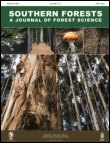
Southern Forests-A Journal of Forest Science
Scope & Guideline
Advancing Sustainable Solutions for Forest Management
Introduction
Aims and Scopes
- Forest Management and Conservation:
Research related to sustainable forest management practices, biodiversity conservation, and restoration of forest ecosystems, emphasizing the importance of maintaining ecological integrity. - Tree Physiology and Genetics:
Exploration of genetic variability, growth dynamics, and physiological responses of various tree species to environmental stressors, which is crucial for breeding programs and improving forest resilience. - Biomass and Carbon Dynamics:
Studies on biomass production, carbon storage, and the role of forests in mitigating climate change through carbon sequestration, highlighting the importance of forest ecosystems in global carbon cycles. - Forest Health and Pest Management:
Investigations into forest pathogens, invasive species, and pest management strategies, contributing to the understanding of forest health and the challenges posed by biological threats. - Technological Advances in Forestry:
Utilization of modern technologies such as remote sensing, machine learning, and modeling techniques to enhance forest monitoring, management practices, and productivity assessments. - Socio-Economic Aspects of Forestry:
Research addressing the socio-economic impacts of forestry practices, including community engagement, non-timber forest products, and the role of forests in local economies.
Trending and Emerging
- Climate Change Impact Studies:
Research focused on the effects of climate change on forest ecosystems, tree growth, and species distribution is gaining traction, emphasizing the need for adaptive management strategies. - Innovative Biotechnological Applications:
Emerging studies on the application of biotechnology in forestry, including genetic modification and advanced propagation techniques, are becoming increasingly prominent in the journal. - Ecosystem Services and Sustainability:
There is a growing emphasis on understanding and quantifying the ecosystem services provided by forests, highlighting their role in supporting biodiversity and human well-being. - Remote Sensing and Precision Forestry:
The use of remote sensing technologies and precision forestry techniques is trending, allowing for enhanced monitoring and management of forest resources. - Interdisciplinary Approaches to Forest Science:
A noticeable trend towards interdisciplinary research that integrates ecological, social, and economic perspectives in forestry, promoting holistic approaches to forest management.
Declining or Waning
- Traditional Timber Production Methods:
There has been a noticeable decrease in research specifically focused on conventional timber production methods, possibly reflecting a shift towards sustainable and innovative practices. - Static Forest Inventory Techniques:
Research centered around traditional static inventory methods is declining, as newer, more dynamic approaches and technologies gain prominence in forest assessments. - Local Species Utilization:
The focus on local tree species for timber and non-timber products appears to be waning, as there is a growing interest in the use of genetically improved and hybrid species. - Historical Forest Management Practices:
Studies examining historical practices in forest management are becoming less common, as contemporary approaches and challenges take precedence in current research. - Basic Forest Ecology Studies:
Although foundational, basic ecological studies are less frequently published, with a trend towards applied research that addresses immediate conservation and management issues.
Similar Journals

Forest Ecosystems
Fostering innovation in forestry and ecology.Forest Ecosystems is a prestigious open access journal published by KEAI PUBLISHING LTD, dedicated to advancing knowledge in the fields of forestry, ecology, and conservation. Established in 2014 and located in Beijing, China, this journal has rapidly gained prominence, achieving Q1 status in multiple categories, including Ecology, Evolution, Behavior and Systematics, and Forestry in 2023. With an impressive rank of 19 out of 174 in the Scopus category of Agricultural and Biological Sciences - Forestry, it stands in the 89th percentile, reflecting its influential contributions to the field. The journal fosters scholarly discourse and disseminates innovative research aimed at understanding forest ecosystems and their vital role in our environment. Offering a robust platform for researchers, professionals, and students, Forest Ecosystems ensures accessibility through its open access format, enabling a wider audience to engage with and benefit from cutting-edge research dedicated to the stewardship of forest resources.
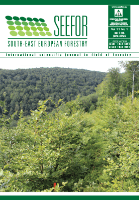
SEEFOR-South-East European Forestry
Advancing sustainable forestry practices in South-East Europe.SEEFOR-South-East European Forestry is a premier open-access journal dedicated to advancing knowledge in the field of forestry and environmental science. Published by the CROATIAN FOREST RESEARCH INSTITUTE, this journal has been operational since 2010, providing a platform for research that focuses on the unique forestry dynamics of the South-East European region. With an ISSN of 1847-6481 and an E-ISSN of 1849-0891, SEEFOR is recognized for its commitment to disseminating high-quality research that addresses critical issues in forestry management, conservation, and sustainable development. The journal is indexed in Scopus, placing it within the third quartile (Q3) of forestry journals, reflecting its significance within the academic community. SEEFOR aims to connect researchers, practitioners, and policymakers, fostering collaboration and innovation in fostering sustainable forestry practices in Croatia and beyond. Submissions are welcome in a range of areas including forest ecology, policy development, and socio-economic impacts, making it an invaluable resource for professionals and students alike.
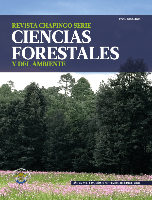
Revista Chapingo Serie Ciencias Forestales y del Ambiente
Advancing knowledge in Ecology and Forestry.Revista Chapingo Serie Ciencias Forestales y del Ambiente, published by Universidad Autónoma Chapingo, serves as a prominent platform for scholars and practitioners in the fields of Ecology and Forestry. Established in 2001, this open access journal has made significant strides in disseminating research that addresses pressing environmental issues, particularly within the Mexican context. With an ISSN of 2007-3828 and E-ISSN of 2007-4018, it has been recognized for its contributions, earning a Q3 ranking in both Ecology and Forestry categories as of 2023. The journal is pivotal in fostering collaboration and knowledge exchange among researchers, professionals, and students dedicated to understanding and preserving forest ecosystems. Access to its rich content is unrestricted, enhancing visibility and impact for innovative research and practical applications in sustainable management and conservation practices.

Sylwan
Exploring innovative solutions for ecological forestry.Sylwan, published by POLSKIE TOWARZYSTWO LESNE, is a key journal in the field of forestry, focusing on the science and practice of sustainable forest management and conservation. Operating since 1979 and releasing issues periodically, including those from 2011 to 2018 and from 2020 to 2024, this journal plays a vital role in disseminating research and advances in forestry practices particularly relevant to Poland and the broader European context. While currently not offering open access options, Sylwan maintains a Q4 ranking in the forestry category according to the Scopus database, highlighting its dedicated niche within the scientific community. The journal serves as an essential resource for researchers, professionals, and students seeking to enhance their understanding of forestry issues in a global and ecological framework. With a commitment to promoting innovative research, Sylwan supports the ongoing dialogue on forestry management and policies, ultimately contributing to the sustainable development of forest resources.
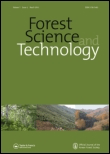
Forest Science and Technology
Advancing sustainable forestry through innovative research.Forest Science and Technology is a premier open access journal published by Taylor & Francis Ltd, based in the United Kingdom. Established in 2005, this journal has become a key platform for disseminating high-quality research in the fields of Forestry and Environmental Science, maintaining a strong impact factor and impressive Scopus rankings. As of 2023, it proudly holds a Q2 quartile ranking in Forestry and a Q3 quartile ranking in Management, Policy, and Law categories, highlighting its significance in addressing contemporary challenges in forest management and conservation. With a dedication to fostering scholarly communication, the journal supports open access since 2017, making valuable findings accessible to a wider audience, including researchers, professionals, and students. With the coverage period extending to 2024, Forest Science and Technology continues to contribute to the discourse on sustainable forestry practices and innovative management strategies.

ANNALS OF FOREST SCIENCE
Uncovering Innovations in Forest ScienceANNALS OF FOREST SCIENCE, published by Springer France, stands at the forefront of ecological research, contributing significantly to both the fields of Ecology and Forestry, as evidenced by its prestigious Q1 ranking in both categories for 2023. Since its inception in 1999, this journal has become an essential resource for academics, practitioners, and students who are eager to explore the complexities of forest ecosystems and their interactions with global environmental changes. With an ISSN of 1286-4560 and E-ISSN 1297-966X, it disseminates cutting-edge research and critical reviews that enhance our understanding of forest science. Although it does not offer open access, the journal continues to be a pivotal platform for presenting innovative scientific findings that address the pressing challenges of forest management and conservation. Its significant impact factor reflects the high-quality contributions that have made a lasting mark on the discipline.

EUROPEAN JOURNAL OF FOREST RESEARCH
Exploring the Dynamics of Forest Health and ConservationThe European Journal of Forest Research (ISSN: 1612-4669; E-ISSN: 1612-4677), published by Springer, stands at the forefront of advancing the field of forestry and plant sciences. With a distinguished reputation reflected in its Q1 category rankings in both Forestry and Plant Science for 2023, this journal excels in disseminating high-quality research that addresses the critical challenges facing forest ecosystems across Europe and beyond. Established in Germany, the journal has transitioned through various phases since its inception in 1996, striving to integrate innovative research findings that promote sustainable forest management and conservation strategies. As part of a rich academic tradition, it boasts a commendable ranking within the Scopus database, placing it in the top echelons of its category. Researchers and practitioners alike can benefit from its commitment to open access options, ensuring that cutting-edge studies are accessible to a global audience. The European Journal of Forest Research serves as an essential platform for knowledge exchange, aiming to enhance the understanding of forest dynamics and improve the management of forest resources in the face of a changing climate.

JOURNAL OF TROPICAL FOREST SCIENCE
Advancing Knowledge in Tropical Forest ManagementThe JOURNAL OF TROPICAL FOREST SCIENCE, published by the FOREST RESEARCH INST MALAYSIA, serves as a vital platform for disseminating research focused on tropical forestry. Since its inception in 1988 and transitioning to its current form in 1993, this journal has established itself within the academic community, currently holding a commendable Q3 ranking in the Forestry category, as per the 2023 metrics. With an ISSN of 0128-1283 and E-ISSN 2521-9847, it provides crucial insights into the ecological, economic, and social aspects of tropical forest management and conservation, making it an indispensable resource for researchers, practitioners, and students alike. Although it does not operate under an open-access model, the journal emphasizes quality and relevance in its publications, contributing significantly to the ongoing discourse in agricultural and biological sciences with a Scopus rank of #89 out of 174 and a 49th percentile position.
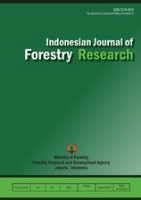
Indonesian Journal of Forestry Research
Connecting knowledge to practice in sustainable forestry.The Indonesian Journal of Forestry Research is a distinguished, peer-reviewed academic journal published by the Ministry of Environment & Forestry of Indonesia. With an ISSN of 2355-7079 and E-ISSN 2406-8195, this journal has been an Open Access platform since 2014, fostering international collaboration and knowledge sharing in the fields of ecology and forestry. As of 2023, the journal holds a respectable Q3 category in both Ecology and Forestry, reflecting its contribution to the science community. It ranks #99/174 in Forestry and #305/461 in Ecology in Scopus, indicating its growing influence in the respective fields. Aimed at researchers, professionals, and students, the Indonesian Journal of Forestry Research provides vital insights and findings, supporting sustainable forestry practices and environmental management in Indonesia and beyond. With an emphasis on innovative methodologies and applied research, this journal stands as a pivotal resource for those dedicated to advancing forestry science and ecological research.

Journal of Forest Science
Empowering global forestry through open access.Journal of Forest Science, published by the Czech Academy Agricultural Sciences, serves as a pivotal resource in the field of forestry and soil science. With its ISSN 1212-4834 and E-ISSN 1805-935X, this Open Access journal has been delivering insightful research since 2003, making knowledge freely available to researchers and practitioners globally. Hailing from the Czech Republic, the journal has established a notable impact within the academic community, as evidenced by its placements in the Q2 quartile for Forestry and Q3 for Soil Science according to the latest rankings. This positions the Journal of Forest Science favorably within academic discourse, ranking #73 out of 174 in Forestry and #84 out of 159 in Soil Science on Scopus, placing it at the 58th and 47th percentiles respectively. Covering a wide range of topics that intersect with environmental sustainability, forest management, and ecological research, the journal aims to foster innovation and collaboration within the scientific community. Researchers, professionals, and students can access published articles easily, bolstering the advancement of knowledge in forest science and its related disciplines.